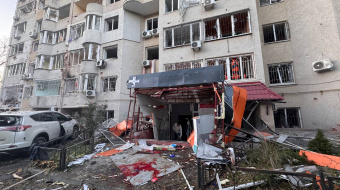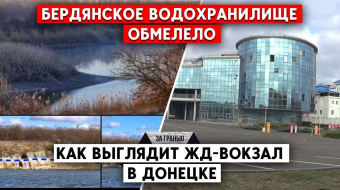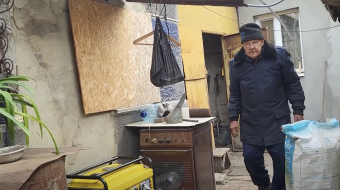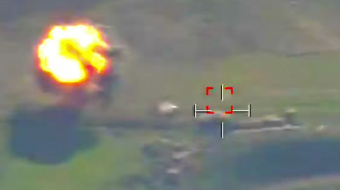Captivity in Donbas. Sexual violence. Part 1
Captivity in Donbas. Sexual violence. Part 1
According to human rights activists, sexual violence is used in Donbas conflict zone as a part of tortures. It makes servicemen and civilians panic. Activists try to record all the cases of sexual violence in order to prevent it. “Radio Liberty” article tells about this.
The house fo Kyiv “Zoloti Vorota” (“Golden Gate”) Theatre is dark, cramped and and makes you feel ill at ease. This is how Alice Kovalenko, the main character of the play named “Captivity” feels. The fist night took place a couple of weeks ago. The light is dim and there are not many prompts: a podium, a table, a chair and a bed. The girl tells the audience about the horrible events of the spring 2014. The so-called separatist “referendum” had just taken place and a 26-year-old documentalist was coming back home from Ukrainian positions. The taxi driver betrayed her at the very first checkpoint.
“She is with Ukrainian servicemen” tells he to the militants and the girl is immediately dragged out of the car. She understands that this is “the end” - she is searched and taken to Kramatorsk. The town was under militants’ control then. First, she was kept in one of the rooms of the town council, then she was taken to some flat. Alice spends five agonizing days, she is tortured and raped by a Russian officer with a call name “Thunder”.
“Captivity” is a recontsruction of a girl’s personal story. She decided to tell it only two years later. Oleksiy Karachynsky, military psychologist and George Jeno, “IDPs’ Theatre” director, help her to tell audiance about the events. George plays a part of a “friend” who leads the girl through memories, especially, painful ones, right on the stage. The psychologist is sure that Alice’s psychological rehabilitation will help her to overcome the aftermath of what happened.
The audience that witnesses outspoken and cruel scenes is silent throughout the whole play, some people cry quietly. Only at the very beginning of the performance, when George makes Alice show the way she was searched at a checkpoint and tells her to stand with her face to the wall, one young man rises from his seat and leaves nervously. There is no applause at the end, people just leave the house and go to have a cigarette. And write in their feedback how grateful they are to the main character.
“A theme no one wants to discuss”
Alice Kovalenko’s openness and sincerity are an exception. Law enforcers who record the cases of sexual violence in the Donbas say that the majority of people avoid mentioning these situations.
“They are embarrassed and they feel humiliated, they do not like telling about that and they are terribly afraid that this information will leak. Even if they want to share this information, they ask for it to remain secret. And, of course, they do not want it to be revealed in international organizations or courts”, says Yuliya Krasylnykova, representative of “Vostok-SOS” NGO.
Volunteers of “Vostok-SOS” NGO questioned 80 ex-captives and none of them agreed to record the cases of sexual violence.
“A woman whi had been in captivity for several days, telephoned us. She tells her story in detail. We record everything and she gives us a permission to share this information. But for the episode when sexual violence happened”, says Krasylnykova.
It is even more difficult for men to recognize the facts of sexual violence, they hardly ever speak about this. However, they often tell the stories which happened to someone else: “I have heard, I have seen, it happened to someone who was kept together with me”.
“Out of 86 people who have been in captivity, only four, both men and women, said that they had gone through sexual violence. Of course, there are more cases, there are certain facts which prove this idea. Still, we cannot say and provoke, a person must be ready himself or herself to tell us everything”, explains Tetyana Syrenko, a psychologist of “Right to Health” Organization which provides those who have been tortured in the Donbas with psychological aid.
The psychologist pays attention to one more problem: this is people who have got into the whirl of mass arrests, kidnappings, exchanges in 2014 and then "got lost”. They did not have thorough medical examinations or medical help. It is more difficult to work with them as their psychological trauma is deeper.
“In general, it is more difficult for people to address a psychotherapist. They do not know who those people are. “Am I crazy?” - this is what they think”, says Syrenko.
There is not any sign on the door of the NGO “Right to Health”. People who have suffered from torture in the conflict zone come there and any signs are avoided deliberately to decrease psychological pressure on the patients.
New service "Explain Ukraine". This is a daily mailout of three articles which were written about the situation in the Donbas by Donbas journalists and translated into English. Honest vision of people who work in the field is unbiased and fresh which is crucial in the world which is full of desinformation and propaganda. We try to share this vision in out daily mailout. You can subscribe here.
















